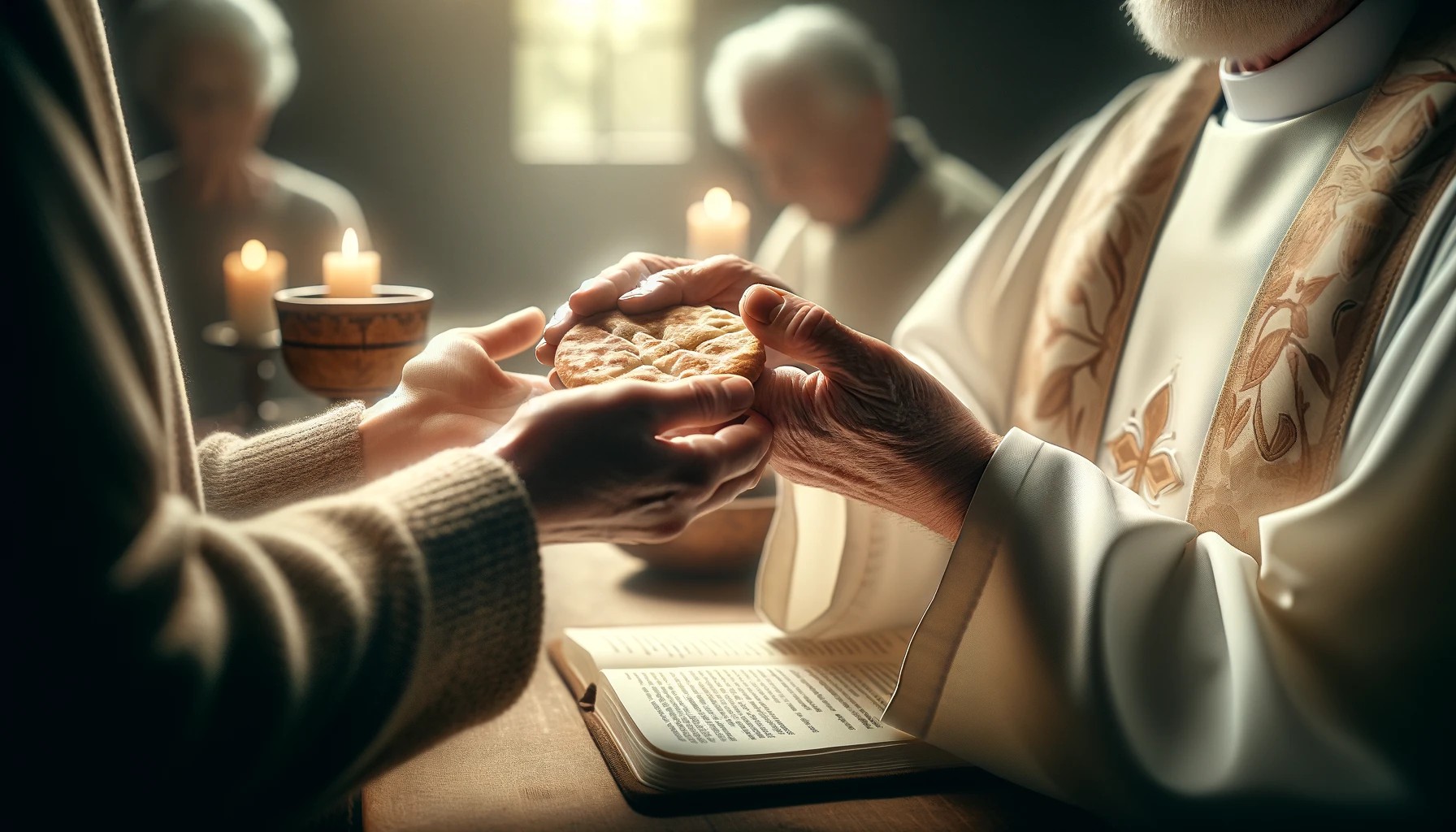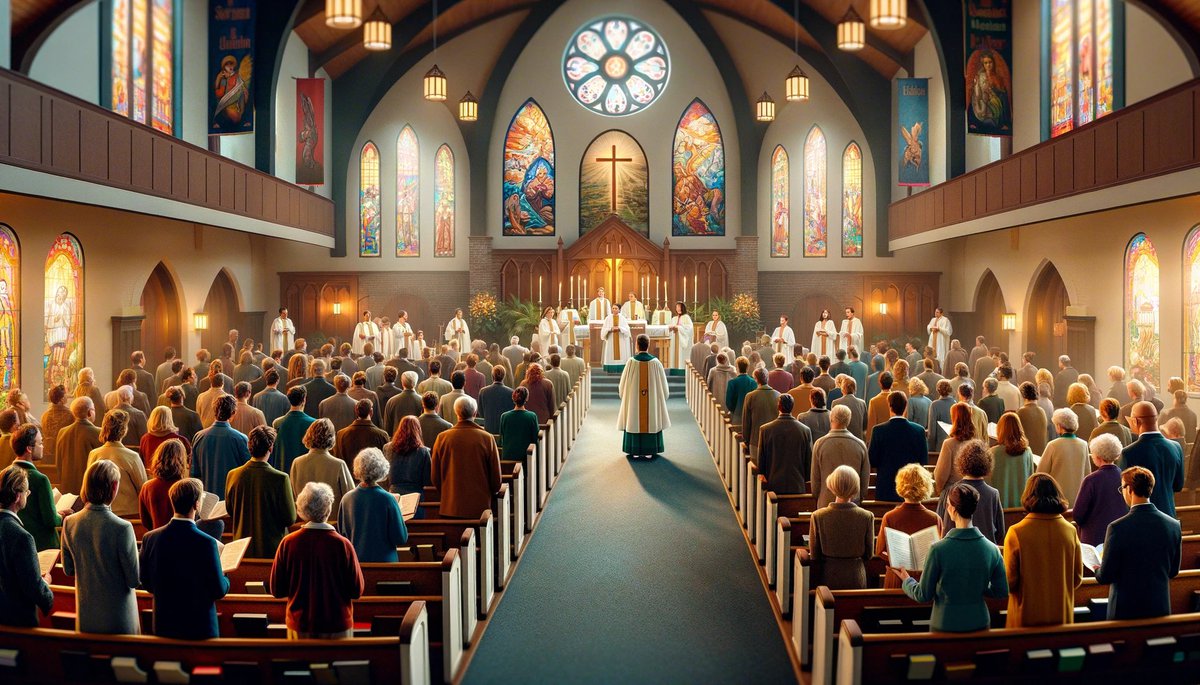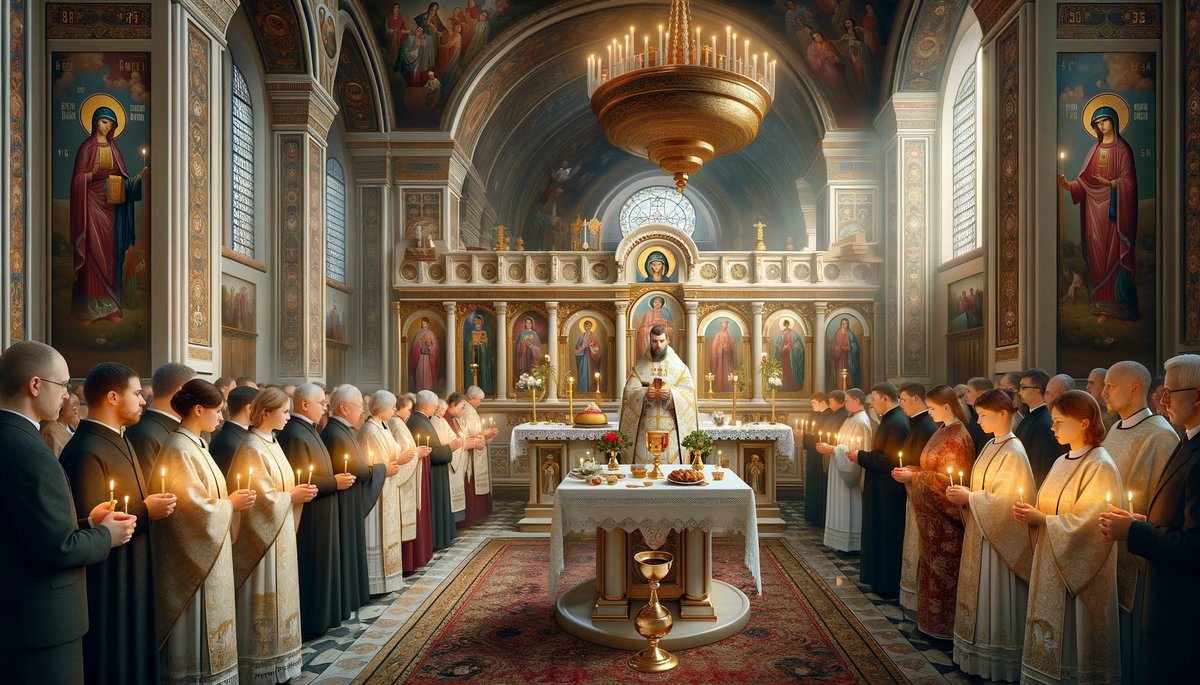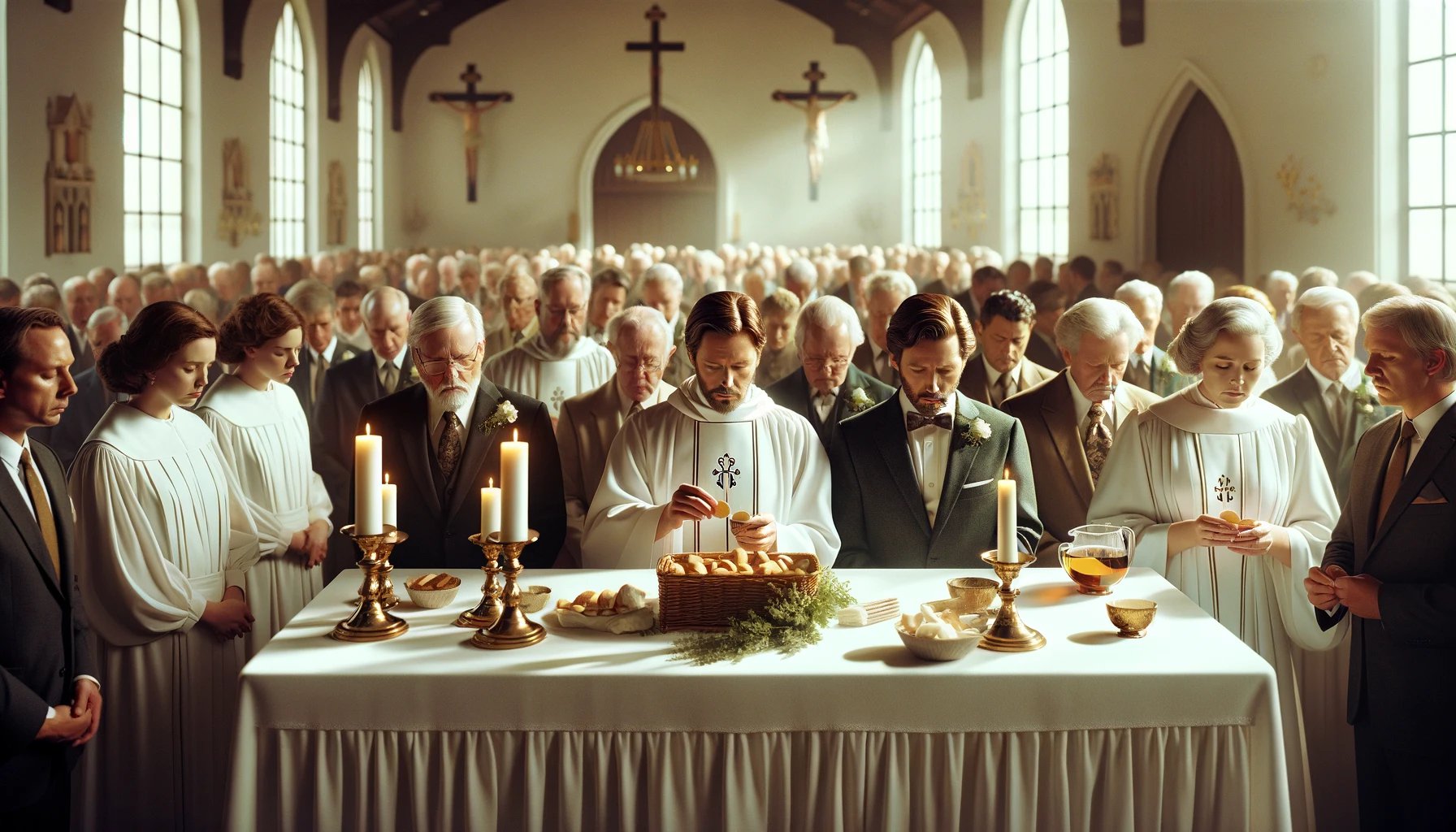Home>Theology and Spirituality>Why Should You Not Take Communion


Theology and Spirituality
Why Should You Not Take Communion
Published: February 25, 2024
Ericka Andersen, an editor at Christian.net, expertly merges digital strategy with content creation, focusing on faith and societal issues. Her communication skills enhance the platform's engaging narratives, fostering meaningful dialogue on belief's impact on society.
Discover the reasons why taking communion may not be suitable for you. Explore the theological and spiritual implications in this insightful discussion.
(Many of the links in this article redirect to a specific reviewed product. Your purchase of these products through affiliate links helps to generate commission for Christian.net, at no extra cost. Learn more)
Table of Contents
Introduction
Communion, also known as the Eucharist or the Lord's Supper, holds profound significance in Christian faith and practice. It is a sacred ritual that symbolizes the body and blood of Jesus Christ and serves as a means of spiritual nourishment and unity within the Christian community. However, there are circumstances in which individuals may choose not to partake in communion. Understanding the reasons behind this decision is essential for fostering a deeper appreciation of the spiritual dynamics at play.
In this article, we will explore several compelling reasons why individuals may opt not to take communion. By delving into these considerations, we can gain a more nuanced understanding of the complexities surrounding this deeply meaningful sacrament. From misconceptions about the purpose of communion to personal faith dynamics and the symbolism inherent in the ritual, each aspect sheds light on the multifaceted nature of this spiritual practice.
As we embark on this exploration, it is important to approach the topic with sensitivity and an open mind. The decision to abstain from communion is deeply personal and can be influenced by a myriad of factors, including theological beliefs, spiritual discernment, and individual circumstances. By delving into these reasons, we can cultivate empathy and understanding for those who may choose not to participate in this central aspect of Christian worship.
Through this journey of exploration, we aim to foster a spirit of inclusivity and understanding within the Christian community, recognizing that diverse perspectives and convictions contribute to the rich tapestry of faith. Let us embark on this enlightening exploration, delving into the multifaceted reasons why some individuals may opt not to partake in communion, and gaining a deeper appreciation for the spiritual dynamics at play.
Misunderstanding of the Purpose of Communion
Misunderstanding the purpose of communion can lead individuals to abstain from partaking in this sacred ritual. At the heart of communion lies a profound symbolism that is deeply rooted in the Christian faith. It serves as a commemoration of Jesus Christ's sacrificial death on the cross and the redemptive significance of His body and blood. However, misconceptions about the nature and significance of communion can influence individuals to refrain from participating.
One common misunderstanding pertains to the belief that communion is merely a symbolic act devoid of spiritual significance. Some individuals may view it as a ritualistic tradition rather than recognizing its profound spiritual implications. This misconception can lead to a lack of reverence and appreciation for the sacredness of communion, prompting individuals to abstain due to a perceived lack of personal relevance.
Furthermore, a misunderstanding of the communal aspect of communion can also contribute to individuals choosing not to partake. Communion is a communal act of worship that fosters unity and fellowship among believers. However, if individuals perceive it solely as an individualistic or exclusive practice, they may feel disconnected from its communal significance. This misunderstanding can lead to a sense of alienation and disengagement, prompting individuals to refrain from participating in communion.
Additionally, misconceptions about the spiritual impact of communion may influence individuals to abstain. Some may hold the belief that partaking in communion is a prerequisite for salvation or spiritual validation. Conversely, others may view it as a superficial or obligatory practice, failing to grasp its transformative potential. These misunderstandings can create a sense of spiritual unease or disconnect, prompting individuals to opt out of communion due to a lack of clarity regarding its spiritual significance.
Addressing these misunderstandings requires a deeper exploration of the theological and spiritual underpinnings of communion. By fostering a comprehensive understanding of its significance as a sacred act of remembrance, unity, and spiritual nourishment, individuals can overcome misconceptions and embrace the profound depth of communion. Through education, reflection, and open dialogue within the Christian community, these misunderstandings can be dispelled, paving the way for a more inclusive and spiritually enriching communion experience for all believers.
Lack of Personal Faith
Lack of personal faith can serve as a compelling reason for individuals to abstain from partaking in communion. Personal faith forms the cornerstone of one's spiritual journey, shaping beliefs, convictions, and the manner in which one engages with religious practices. When individuals experience a lack of personal faith, it can significantly impact their willingness to participate in sacred rituals such as communion.
At the heart of communion lies a profound connection to one's faith in Jesus Christ and His redemptive work. For individuals grappling with doubts, spiritual uncertainties, or a sense of distance from their faith, partaking in communion may feel incongruent with their current state of belief. This internal struggle can lead to a conscientious decision to refrain from participating in a ritual that holds deep spiritual significance.
Moreover, individuals navigating a period of spiritual introspection or questioning may choose to abstain from communion as a means of honoring the authenticity of their faith journey. Rather than engaging in a practice that feels disconnected from their internal spiritual landscape, they may opt for a period of reflection and discernment, seeking to align their participation in communion with a genuine and deeply rooted faith experience.
Furthermore, individuals who have yet to fully embrace the Christian faith or are in the process of exploring their beliefs may choose not to partake in communion. This decision stems from a place of respect for the sacredness of the ritual and a desire to approach it with a sincere and unwavering faith foundation. By refraining from communion until their faith has matured and solidified, these individuals demonstrate a deep reverence for the spiritual significance of the sacrament.
Navigating the complexities of personal faith requires empathy, understanding, and a recognition of the diverse spiritual journeys individuals undertake. By honoring the decisions of those who choose not to partake in communion due to a lack of personal faith, the Christian community can foster an environment of inclusivity and support. Embracing individuals at various points along their faith journey, and affirming the validity of their spiritual experiences, contributes to a culture of compassion and understanding within the Christian faith.
In essence, the decision to abstain from communion due to a lack of personal faith reflects a deeply introspective and conscientious approach to spiritual practice. By acknowledging and respecting the diverse expressions of faith within the Christian community, individuals can navigate their spiritual journey with authenticity and integrity, fostering a culture of empathy and inclusivity within the body of believers.
Unconfessed Sin
Unconfessed sin stands as a poignant reason for individuals to abstain from partaking in communion. Within the Christian faith, the acknowledgment and repentance of sin hold profound significance, shaping the spiritual landscape of believers. When individuals grapple with unconfessed sin, the decision to refrain from communion emerges from a place of reverence, introspection, and a deep sense of spiritual accountability.
At the core of communion lies a call to partake in a sacred remembrance of Jesus Christ's redemptive sacrifice. It serves as a poignant symbol of His body broken and His blood shed for the forgiveness of sins. However, when individuals carry the weight of unconfessed sin, the act of partaking in communion can evoke a profound internal conflict. The juxtaposition of partaking in a ritual centered on forgiveness while harboring unconfessed transgressions can create a sense of spiritual discord and dissonance.
Furthermore, the act of communion calls for a spirit of humility, contrition, and genuine repentance. When individuals grapple with unconfessed sin, the invitation to approach the communion table with a clear conscience and a heart open to reconciliation can feel incongruent with their internal spiritual state. As a result, the decision to abstain from communion reflects a conscientious acknowledgment of the need for sincere repentance and the resolution of unconfessed sin before partaking in this sacred ritual.
Moreover, the act of refraining from communion due to unconfessed sin underscores a profound commitment to spiritual authenticity and integrity. It signifies a deep reverence for the sanctity of communion and a recognition of the transformative power inherent in the act of confession and repentance. By choosing to address unconfessed sin before partaking in communion, individuals demonstrate a steadfast commitment to upholding the sacredness of the ritual and honoring the redemptive significance of Jesus Christ's sacrifice.
Navigating the complexities of unconfessed sin requires a spirit of humility, introspection, and a genuine desire for spiritual restoration. By honoring the decisions of those who choose not to partake in communion due to unconfessed sin, the Christian community can foster an environment of grace, accountability, and support. Embracing individuals as they navigate the journey of confession, repentance, and spiritual renewal contributes to a culture of compassion and understanding within the body of believers.
In essence, the decision to abstain from communion due to unconfessed sin reflects a deeply introspective and conscientious approach to spiritual practice. By acknowledging and respecting the diverse spiritual journeys individuals undertake, the Christian community can cultivate an environment of empathy, grace, and unwavering commitment to the transformative power of confession and reconciliation.
Disunity within the Church
Disunity within the church stands as a poignant reason for individuals to abstain from partaking in communion. The unity of believers lies at the heart of Christian fellowship, and when discord, division, or unresolved conflicts permeate the church community, the decision to refrain from communion emerges from a place of deep concern, spiritual discernment, and a commitment to fostering genuine unity within the body of believers.
At the core of communion lies a call to partake in a sacred act of remembrance and unity, symbolizing the shared bond of faith and the communal participation in the redemptive work of Jesus Christ. However, when disunity casts a shadow over the church, the invitation to partake in communion can evoke a profound internal conflict. The juxtaposition of engaging in a ritual centered on unity and fellowship while grappling with unresolved discord within the church community can create a sense of spiritual dissonance and unease.
Furthermore, the act of communion calls for a spirit of reconciliation, forgiveness, and genuine unity among believers. When individuals witness or experience disunity within the church, the invitation to approach the communion table with a spirit of harmony and mutual respect can feel incongruent with the prevailing atmosphere of discord. As a result, the decision to abstain from communion reflects a conscientious acknowledgment of the need for genuine reconciliation, healing, and restoration of unity within the church community.
Moreover, the act of refraining from communion due to disunity within the church underscores a profound commitment to fostering an environment of genuine fellowship, reconciliation, and spiritual harmony. It signifies a deep reverence for the sanctity of communion and a recognition of the transformative power inherent in the restoration of unity within the body of believers. By choosing to address and seek resolution for disunity within the church before partaking in communion, individuals demonstrate a steadfast commitment to upholding the sacredness of the ritual and honoring the call to pursue genuine unity within the Christian community.
Navigating the complexities of disunity within the church requires a spirit of humility, empathy, and a genuine desire for reconciliation and restoration. By honoring the decisions of those who choose not to partake in communion due to concerns about disunity, the Christian community can foster an environment of grace, accountability, and a steadfast commitment to pursuing genuine unity and fellowship. Embracing individuals as they navigate the journey of reconciliation and unity contributes to a culture of compassion and understanding within the body of believers.
In essence, the decision to abstain from communion due to disunity within the church reflects a deeply introspective and conscientious approach to spiritual practice. By acknowledging and respecting the diverse spiritual journeys individuals undertake, the Christian community can cultivate an environment of empathy, grace, and unwavering commitment to the pursuit of genuine unity and fellowship within the body of believers.
Read more: Why Do Catholics Take Communion
Lack of Understanding of the Symbolism of Communion
Lack of understanding of the symbolism of communion can significantly impact an individual's decision to abstain from partaking in this sacred ritual. At the heart of communion lies a profound and multifaceted symbolism deeply rooted in the Christian faith. It serves as a commemoration of Jesus Christ's sacrificial death on the cross and the redemptive significance of His body and blood. However, a lack of comprehension regarding the rich symbolism inherent in communion can lead individuals to perceive it as a ritual devoid of personal relevance or spiritual depth.
One aspect of the symbolism of communion centers on the concept of spiritual nourishment and sustenance. The act of partaking in the bread and wine symbolizes the spiritual sustenance derived from Jesus Christ, who proclaimed Himself as the "bread of life" and the source of eternal nourishment for believers. However, individuals who lack a deep understanding of this symbolism may fail to recognize the profound spiritual nourishment offered through communion, leading to a sense of disconnect from its significance.
Furthermore, the symbolism of communion encompasses the themes of unity and fellowship within the Christian community. The act of partaking in the elements signifies the communal participation in the redemptive work of Jesus Christ and the shared bond of faith among believers. However, individuals who lack a comprehensive understanding of this symbolism may perceive communion as a solitary or exclusive practice, failing to grasp its profound communal significance. This misunderstanding can lead to a sense of disconnection from the communal aspect of communion, prompting individuals to refrain from participating.
Moreover, the symbolism of communion extends to the concept of remembrance and reverence for Jesus Christ's sacrificial death. The act of partaking in the bread and wine serves as a poignant remembrance of Christ's body broken and His blood shed for the forgiveness of sins. However, individuals who lack a deep understanding of this symbolism may view communion as a superficial or obligatory practice, failing to grasp its profound significance as a sacred act of remembrance and reverence.
Addressing the lack of understanding of the symbolism of communion requires a concerted effort to educate, illuminate, and foster a deeper appreciation for its multifaceted significance. By delving into the rich symbolism of communion as a source of spiritual nourishment, a symbol of unity and fellowship, and a sacred act of remembrance, individuals can overcome misconceptions and embrace the profound depth of communion. Through education, reflection, and open dialogue within the Christian community, these misunderstandings can be dispelled, paving the way for a more inclusive and spiritually enriching communion experience for all believers.
Conclusion
In conclusion, the decision to abstain from communion is deeply nuanced and can be influenced by a myriad of factors, including misunderstandings of its purpose, lack of personal faith, unconfessed sin, disunity within the church, and a lack of understanding of its profound symbolism. Each of these reasons reflects the complex interplay of theological, spiritual, and communal dynamics that shape the individual's approach to this sacred ritual.
It is essential to approach the topic of abstaining from communion with empathy, understanding, and a recognition of the diverse spiritual journeys individuals undertake. The decision to refrain from partaking in communion is often rooted in a deep sense of spiritual discernment, personal conviction, and a commitment to honoring the sacredness of the ritual. By acknowledging and respecting these decisions, the Christian community can foster an environment of inclusivity, support, and genuine understanding.
Furthermore, addressing the underlying reasons for abstaining from communion calls for a concerted effort to cultivate a deeper appreciation for the spiritual significance of this sacred ritual. Through education, open dialogue, and a commitment to fostering a culture of empathy and inclusivity, individuals can gain a more comprehensive understanding of the multifaceted dynamics at play when it comes to participation in communion.
Ultimately, the decision to abstain from communion should be met with compassion, support, and a steadfast commitment to upholding the diverse spiritual experiences within the Christian community. By embracing individuals at various points along their faith journey and affirming the validity of their convictions, the body of believers can cultivate an environment of grace, understanding, and unwavering commitment to the transformative power of spiritual discernment and conviction.
As we navigate the complexities surrounding the decision to abstain from communion, let us strive to foster a community where diverse perspectives are honored, spiritual journeys are respected, and the sacredness of communion is upheld with reverence and inclusivity. Through this approach, the Christian community can embody the spirit of unity, empathy, and unwavering support for all who seek to engage with the profound spiritual dynamics inherent in the act of communion.














